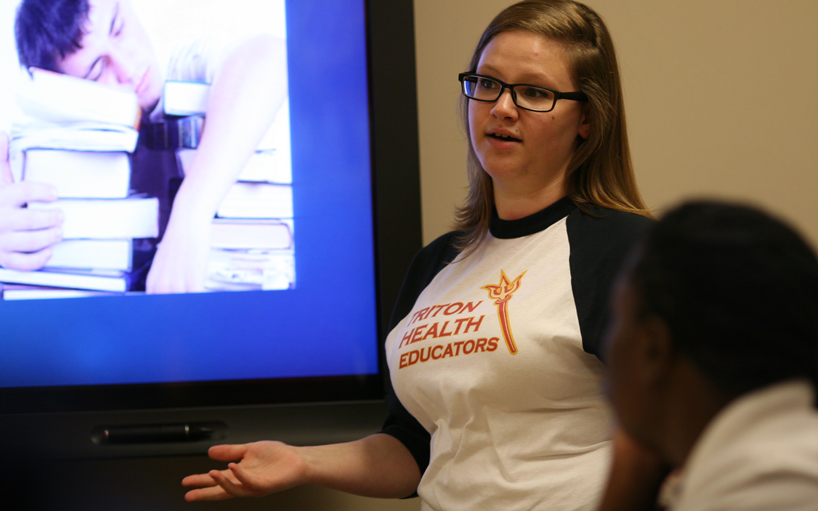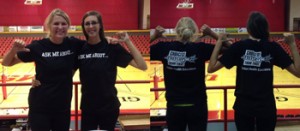
UMSL nursing major Madlyne Bogdajewicz, one of a handful of students volunteering as Triton Health Educators for an NCAA-funded project, gives a presentation on managing midterms in the Millennium Student Center. (Photo by Evie Hemphill)
Twenty University of Missouri–St. Louis undergraduates are making the safety and well-being of fellow students a top priority as volunteers in a new initiative.
Composed of college athletes, nursing majors and an assortment of other UMSL students serving as Triton Health Educators, the group is leading a grant-funded project titled CHOICES to reduce alcohol misuse and other high-risk behaviors.
Nearly 100 students and family members attended a kickoff event in the Mark Twain Athletic & Fitness Center following a UMSL volleyball match last month, and it’s only the beginning, said Peer Education Leader Megan Sandbothe, a senior nursing major.
“We’re kind of in a building phase, but we expect [CHOICES] will grab their attention,” Sandbothe said.
Made possible through grant funding from the NCAA and Partners in Prevention, Missouri’s higher education substance abuse consortium, the efforts focus on peer-to-peer education, experiential outreach and presenting information that students “can’t unlearn,” as one volunteer put it. The group’s mission is “to encourage health and wellness in the UMSL community through education, awareness and prevention.”

UMSL students Kelly Kunkel (left) and Megan Sandbothe are two of 20 volunteer Triton Health Educators. They helped organize the CHOICES kickoff on Sept. 23, featuring giveaways, information, a giant inflatable-oriented activity, sweet treats and more. (Click to enlarge.)
With some intensive training behind them, the peer educators have a variety of programs in the works aimed at encouraging Tritons to “think first.” These range from pouring exercises that help people understand more about alcohol content to presentations on prescription-drug abuse, consent and safe dating.
“I wanted to be a Triton Health Educator because I wanted to get involved with the UMSL community and make a difference,” said junior nursing major Abbey Boeker, who is serving as the group’s programming director. “This has helped me network and get to know fellow students, and I’ve learned how to help people with difficult topics such as sexual assault. Just talking to other students at outreach tables has opened my eyes to what issues we have on campus and how we, as a team, can address these issues to make a healthier UMSL.”
Sandbothe added that while she’s having fun networking with different departments, athletic teams and students on a project for the greater good of the campus community, it’s also forcing her to strengthen her presentation skills.
“That will be beneficial and translate over to educating patients and families in my future career as a nurse,” Sandbothe said.
UMSL social worker Robin Kimberlin called the grant-funded effort a big opportunity for a Division II school and said it’s important that the project focuses on peer-to-peer education, involving student-athletes from a variety of men’s and women’s teams as well as other students in seeking smart solutions and healthy alternatives to common high-risk behaviors.
“Peers speak the language of the students,” Kimberlin said. “They can be where we as professionals can’t be. They are at the party, bar, sporting event. They can act as leaders and role models as well as educators.”















